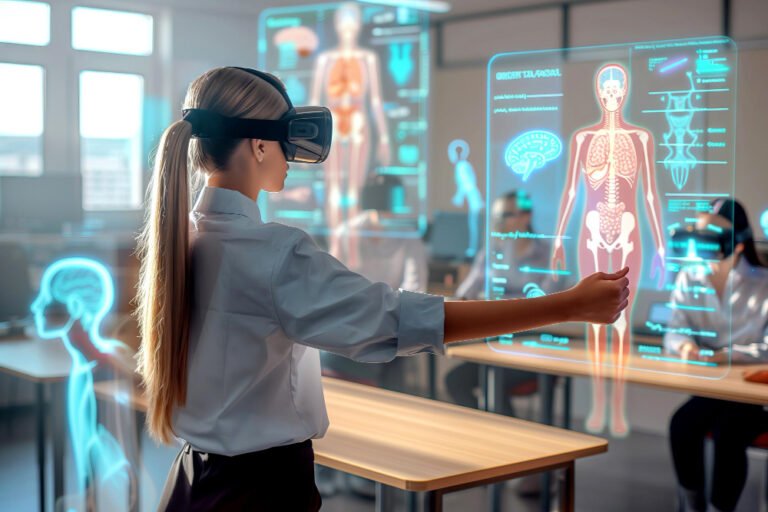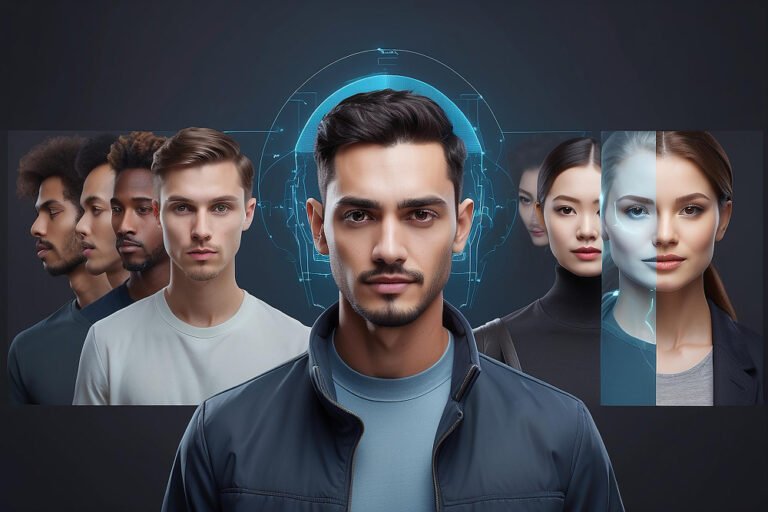Can AI Replace Your Doctor? Debunking Myths of Digital Healthcare and AI in Medicine
The world of medicine is rapidly evolving, and with it, the role of technology. Artificial intelligence (AI) has become a hot topic, sparking both excitement and apprehension. One common question on everyone’s mind: will AI robots replace our doctors someday?
The answer is a resounding no. AI isn’t here to steal your doctor’s stethoscope – it’s here to be a powerful partner in healthcare. Here, we’ll debunk some of the biggest myths surrounding AI in healthcare and explore how it’s actually transforming medicine for the better. We’ll also discuss a specific website, Aiotechnical.com, and its role in digital healthcare and AI-powered solutions.
Debunking the Myths: AI as a Partner, Not a Replacement
Myth 1: AI Will Render Doctors Obsolete
AI excels at analyzing vast amounts of data, identifying patterns, and assisting in diagnoses. However, it lacks the human touch, empathy, and critical thinking skills essential for good healthcare. Doctors will always be needed to interpret AI findings, make complex decisions based on individual patient experiences, and provide emotional support. Imagine AI as a powerful new tool in your doctor’s toolbox, not a robot stealing their job.
Myth 2: AI Can Diagnose You Better Than a Doctor
AI algorithms can analyze medical scans, patient records, and symptom checklists with impressive accuracy. However, they rely on the data they’re trained on and can’t account for individual nuances or a patient’s complete medical history. Doctors use AI as a powerful tool for diagnosis, not a replacement for their own expertise.
Myth 3: AI-Powered Healthcare is Cold and Impersonal
AI can actually enhance the patient experience by streamlining processes and freeing up doctors’ time. Imagine an AI assistant gathering your medical history beforehand, allowing your doctor to jump right into personalized care. AI-powered chatbots can also provide preliminary guidance and answer basic questions, reducing wait times and anxiety.
Myth 4: AI Decisions are a Black Box
Early AI models were indeed opaque, making it difficult to understand how they reached a conclusion. However, advancements in “explainable AI” are making these systems more transparent. Today’s AI can often provide insights into its reasoning, allowing doctors to understand the logic behind its suggestions.
Myth 5: AI is Unreliable and Prone to Bias
Like any tool, AI is good according to the data it’s trained on. Data biases can result in AI outputs that are biased. Thankfully, the medical field is increasingly aware of this issue, and developers are working on more diverse and inclusive datasets.
The Power of AI in Your Healthcare Journey
AI’s true potential lies in its ability to augment human doctors, not replace them. Now that we’ve debunked the myths, let’s explore the exciting ways AI is revolutionizing healthcare:
- Enhanced Diagnostics: AI algorithms can analyze medical scans with incredible detail, helping doctors identify even the subtlest abnormalities. This can lead to earlier and more accurate diagnoses.
- Personalized Medicine: AI can analyze your medical history, genetics, and lifestyle to create personalized treatment plans and preventative measures. Imagine receiving targeted healthcare based on your unique needs.
- Improved Efficiency: AI can automate administrative tasks, freeing up doctors’ time for what they do best – interact with patients. This can lead to shorter wait times and more personalized consultations.
- Research & Development: AI can analyze vast sets of medical data to identify trends and develop new treatments. This can accelerate medical research and lead to breakthroughs in patient care.
- Drug Discovery: AI is accelerating the process of drug discovery by analyzing massive datasets of molecular structures and identifying potential drug candidates.
- Virtual Assistants and Chatbots: AI-powered virtual assistants and chatbots can answer patients’ questions, provide educational resources, and even offer basic symptom triage.
Real-World Examples
Let’s explore some current applications of AI in healthcare:
- Radiology: AI can analyze X-rays, CT scans, and MRIs, highlighting potential problems for radiologists to review. This speeds up the diagnosis process and improves accuracy.
- Dermatology: AI can analyze skin lesions with impressive accuracy, helping doctors identify skin cancer early.
- Genomics: AI can analyze vast amounts of genetic data, aiding in understanding and treating genetic diseases.
The Future of Digital Healthcare: Aiotechnical.com and Beyond
Aiotechnical.com is just one example of the growing trend of digital healthcare platforms leveraging AI. The Aiotechnical platform offers a range of services, including:
- Digital Health Resources: Access to reliable information on various health topics, symptom checkers, and tools for managing chronic conditions.
- AI-Powered Consultations: Chatbots or virtual assistants powered by AI could provide basic health advice, answer frequently asked questions, and help with appointment scheduling.
- Personalized Beauty Recommendations: AI algorithms could analyze your skin type and recommend personalized beauty routines with AI-powered product analysis.
- Telemedicine: Connecting patients with doctors virtually for consultations and follow-up appointments.
- Online Symptom Checkers: AI-powered tools that can help users identify potential causes of their symptoms and recommend seeking medical attention if necessary. (Remember, these tools should never replace a proper diagnosis from a doctor.)
- Wearable Tech Integration: Analyzing data from wearable devices like fitness trackers and smartwatches to monitor health metrics and identify potential health risks.
These digital tools empower patients to take a more active role in their health management, improving the accessibility and convenience of healthcare services. However, it’s crucial to remember that these platforms are meant to complement, not replace, traditional doctor-patient interactions.
Ethical Considerations for AI in Medicine
As with any powerful technology, AI in healthcare raises ethical concerns.
- Data Privacy and Security: The most important thing is protecting patient data. Robust security measures must be in place to prevent breaches.
- Algorithmic Bias: As mentioned earlier, ensuring diverse and unbiased data sets for training AI models is critical to avoid perpetuating existing inequalities in healthcare.
- Transparency and Accountability: The healthcare community needs clear guidelines for deploying AI in a responsible and transparent manner. Patients should be aware of how AI is being used in their care and have the right to opt out if they feel uncomfortable.
Human-AI Partnership is the Future of Healthcare
The future of medicine is one where AI empowers doctors, not replaces them. Imagine doctors armed with AI-powered diagnostic tools, personalized treatment plans based on individual data, and more time to interact with and care for their patients. This human-AI partnership holds immense potential to improve overall healthcare outcomes and patient experiences.
Challenges
However, several challenges need to be addressed:
- Data Privacy: Ensuring the secure storage and ethical use of patient data is crucial.
- Accessibility: Ensuring everyone has access to affordable and reliable AI-powered healthcare tools.
- Regulation: Establishing clear guidelines for the development and use of AI in medicine to ensure safety and effectiveness.
Addressing the Challenges:
Overcoming these challenges is crucial to ensure responsible and equitable access to AI-powered healthcare.
- Strong Data Privacy Laws: Implement regulations that protect patient data and give patients control over how their information is used.
- Focus on Inclusivity: Developing AI algorithms that are trained on diverse datasets to avoid biases and ensure fair outcomes for all patients.
- Standardized Training & Certification: Establishing clear standards for training and certifying AI-powered healthcare tools to ensure their accuracy and safety.
- Public Education & Awareness: Educating patients about how AI is used in healthcare, addressing concerns, and promoting responsible adoption.
What You Can Do
As a patient navigating the evolving landscape of healthcare with AI, here are some things you can do:
- Stay Informed: Educate yourself on how AI is being used in medicine. Ask your doctor how it might be applied in your specific care.
- Embrace the Benefits: Be open to the potential of AI to improve your healthcare experience.
- Ask Questions: Don’t hesitate to ask your doctor about AI-powered tools used in your diagnosis or treatment plan.
- Data Privacy: Be mindful of what health data you share online and on apps. Understand the privacy policies of any digital healthcare platforms you use.
- Maintain a Doctor-Patient Relationship: While AI-powered tools can be helpful, a strong doctor-patient relationship remains vital. Don’t rely solely on AI for your health needs.
Conclusion:
AI is not here to replace your doctor; it’s here to revolutionize medical care alongside human expertise. By embracing this partnership, we can create a future of personalized medicine, faster diagnoses, and improved treatment outcomes. Keep in mind, AI functions as a tool, and just like any tool, its impact relies on our utilization of it. With careful planning, responsible development, and a focus on human-centered care, AI can transform healthcare for the better.







